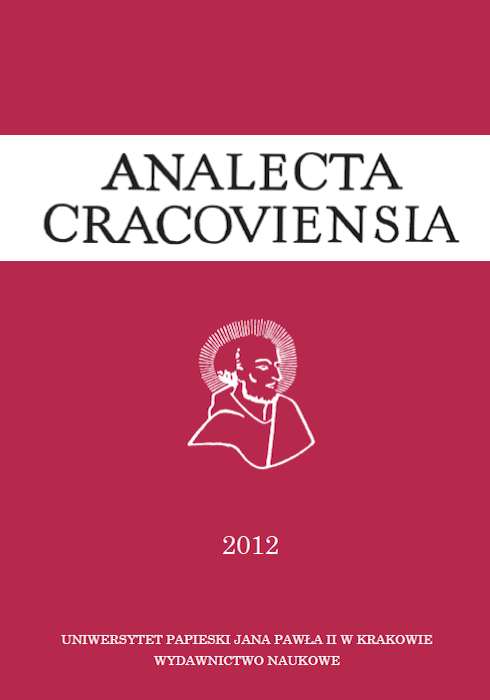Przyjaciele Boga (gnostycy) – współdziałającymi w trudzie nabywania cnoty. Przyczynek do aretologii Klemensa Aleksandryjskiego
DOI:
https://doi.org/10.15633/acr.16Słowa kluczowe:
Aretology, Clement of Alexandria, gnostic, patrology, virtueAbstrakt
Acquiring virtue, understood as a well-ordered personality, is connected with a considerable toil, as follows from the writings of Clement from Alexandria. Its source is to be ascribed, first of all, to the necessity of being true to God’s commandments, but also to overcoming discouragement caused by: the long-lasting process of its acquiring, the conviction of impossibility to achieve it, undertaking yet again the ceased “moral cultivation” or other appropriate actions not infrequently given up under the influence of the opinion of the environment. Therefore, the one who acquires virtue, is supported by a gnostic, a perfect Christian, filled with concern for others, who, thanks to his acquired and constantly perfected virtue, becomes – both, for those who intend undertaking the toil of its acquiring, and those who walk the road of virtue – first of all a guarantor of its achievement, encouraging thereby to acquiring it. While being somehow a witness of virtue, he uses in relation to those who strive for it, credible verbal instructions, thus mobilizing those who are discouraged by the toil of acquiring it, to walk the chosen road of virtue. Besides, he tries to discern the moral and intellectual condition of those who begin to acquire virtue, which has an essential influence on the character of the proposed actions that introduce to its acquiring. What’s more, an expression of that help is an encouragement to follow him, a command and also prayer. However, the help provided this way should be a contribution not so much of the gnostics himself, as of the whole people of God, obliged to holiness on account of the sacrament of baptism.
Pobrania
Opublikowane
Numer
Dział
Licencja
Prawa autorskie (c) 2012 Bruno Zgraja

Praca jest udostępniana na licencji Creative Commons Attribution-NonCommercial-NoDerivatives 3.0 Unported License.
Obecnie autorzy publikujący w czasopiśmie udzielają jego wydawcy zgody o następującej treści:
- Autor zachowuje autorskie prawa majątkowe do utworu, a jednocześnie udziela wydawcy czasopisma zgody na jego pierwszą publikację w wersji drukowanej i wersji online na licencji Creative Commons Uznanie autorstwa 4.0 Międzynarodowe oraz zgody na wykonywanie opracowań, w tym przekładów.
- Autor ma możliwość udzielania zgody niewyłącznej na opublikowanie utworu w wersji, która ukazała się w czasopiśmie (np. zamieszczenia go w repozytorium instytucjonalnym lub opublikowania w książce), wraz z informacją o jego pierwszej publikacji w czasopiśmie.
- Autor może umieścić swój utwór online (np. w repozytorium instytucjonalnym lub na swojej stronie internetowej) jeszcze przed zgłoszeniem utworu do czasopisma.

